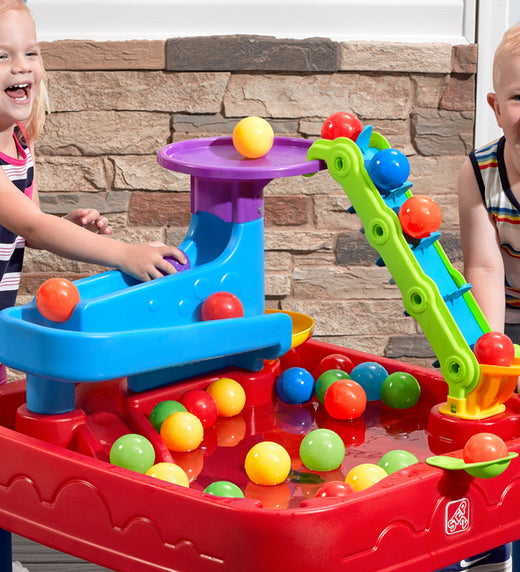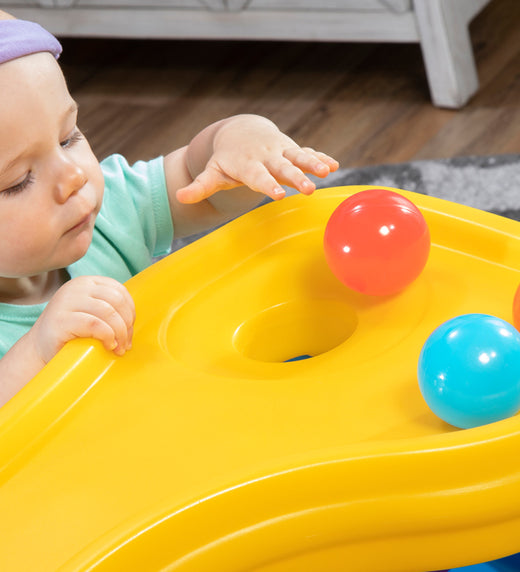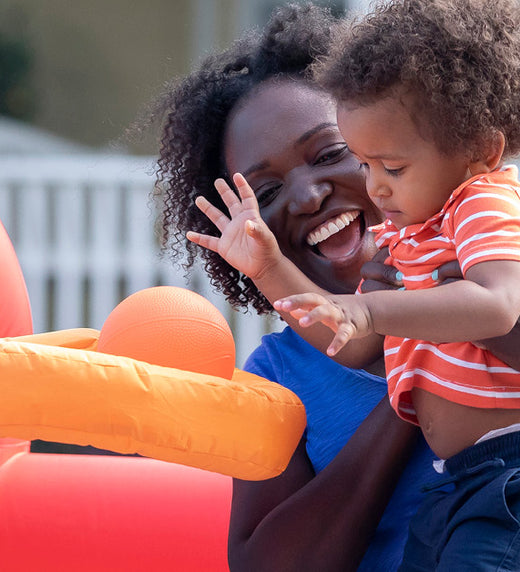
By Dr. Keili Mistovich, MD, MPH
Learning cause and effect is one of the key cognitive development milestones of childhood. Ultimately, cause and effect are the basis for most of our interactions in the world—and children waste no time in starting to explore!
Cognitive Development in Early Childhood
One of the first life lessons that babies learn is that simple actions produce a response. For example, they may realize if I cry, my mom will come or if I make a smiling face at my dad, he will smile back at me.
Starting around 8 months of age, children can piece together the idea of if I do this, then that will happen. You’ll notice complex, deliberate, and repetitive behaviors happening—such as the unfortunate yet seemingly universal study of gravity that all babies undertake. You know the one; it typically involves throwing food or dishes off of the high chair and onto the ground. You pick it up, and down it goes again.
Sometimes, your child is showing you that they’re done eating—or simply don’t want what you’ve chosen for them! However, other times—especially when it’s an innocent single Cheerio or one slice of apple at a time—it’s true exploration of the principles of physics. Your inquisitive child is testing out what happens when they drop something from above.
Your little scientist is learning about how fast an item falls, the sounds it makes, and what happens when it hits the ground. Does it bounce? Does it splatter and splash? You’ll see them try it again and again, often with great enthusiasm. You’re witnessing their minds expand, one Cheerio or apple at a time.
Exploring Actions & Consequences Through Cause & Effect
As children grow, you’ll observe increased complexity to their exploration as they learn that actions have consequences. Simultaneously, with this developing phase of exploration of cause and effect, you’ll often hear your children pairing language with their new understanding of the world. For example, you may hear toddlers repeating, “Hot! Hot!” whenever their hand reaches towards a stove or, “Cold!” when they see it snowing outside.
Children are beginning to verbalize what their minds are starting to understand. In other words, children are processing if I touch the stove, it will be hot or if I go outside in the snow, it will be cold.
Children will even tell themselves a stern, “No!” if they’re starting to engage in an activity for which you have corrected them in the past. They’ve learned that when they start to reach for the door knob to the basement stairs, you always tell them, “No!” Then, as they get older, they’ll learn that the reason mom says, “No!” when I try to open the door is because stairs can be dangerous, and I might fall down them and get hurt.
Cognitive Development Activities: Self-Explanation
Research tells us that one of the most effective ways that children learn is by self-explanation: Kids explain out loud what they’re doing and thinking. Self-explanation encourages children to engage their critical reasoning skills and think more like scientists.
Explaining your thoughts to others allows for two specific processes to happen:
- When you verbalize your thoughts, you naturally organize and reflect on what your brain is thinking as you compose your ideas.
- By speaking your thoughts out loud, it gives an opportunity for the person who’s listening to respond back and ask questions.
Using Toys for Cognitive Development
Toys are a perfect medium for exploration and self-explanation. Let’s take the idea of self-explanation into the context of a child who’s playing with one of Step2’s water tables. With these sensory tables, opportunities to engage in cause-and-effect play are plentiful. Let’s use the simple example of pouring water from a bucket.
This conversation will vary depending on the age of your child. Here, I’ll use the example of a preschool-aged child:
- Hand your child a bucket and then prompt their self-explanation skills by asking, “What do you think will happen if you pour the water into the boat?”
- Your child may describe what’s happening, such as saying, “The water goes down, down and sinks the boat!”
- You can respond with, “That’s right, the water filled the boat all the way up, and then it tipped over and sunk! Let’s see what happens if we pour the water from higher up here…” and so on.
If your child isn’t quite sure how to respond, this is a great time to model how to think out loud. You can say, “Watch me pour out this bucket of water! It makes such a big splash in the pool! I’m going to try pouring the water on top of the boat—oh my goodness, the boat filled up with water and then it sank!”
Developing Cognitive Skills Through Motor Skills
Another great time to encourage your child to think about cause and effect is by playing with toys that engage their gross motor skills. Ask questions, such as:
- What happens when you pedal faster on your bike?
- How can you make yourself swing higher?
Step2’s swing sets, coasters, and climbers, such as the Naturally Playful Woodland Climber II™, provide the ideal setup for these types of cause-and-effect experiments.
Boost Cognitive Development with Cause & Effect Play
Learning about cause and effect is just one of the many cognitive skills that your child will explore during their years of childhood development. By prompting your child with questions, you can incorporate teaching into your everyday interactions. With your help and the use of toys for cognitive development, you’ll make learning easy, fun, and even exciting!
How do you explore cause and effect with your little one? Share in the comments below!
Dr. Keili Mistovich, MD, MPH, is a mom, pediatrician, and fierce advocate for children. She earned a Doctor of Medicine degree and Master’s of Public Health from the University of Pittsburgh School of Medicine. Dr. Keili graduated from the Pediatric Residency Program at UPMC Children’s Hospital of Pittsburgh and was on the clinical faculty at Pitt. She also cared for children at the nationally renowned Cleveland Clinic and University Hospitals Rainbow Babies and Children’s Hospital. Dr. Keili is now a co-founder of Greater Cleveland Pediatrics, a new practice with a unique and personalized approach to patient care for all families.


